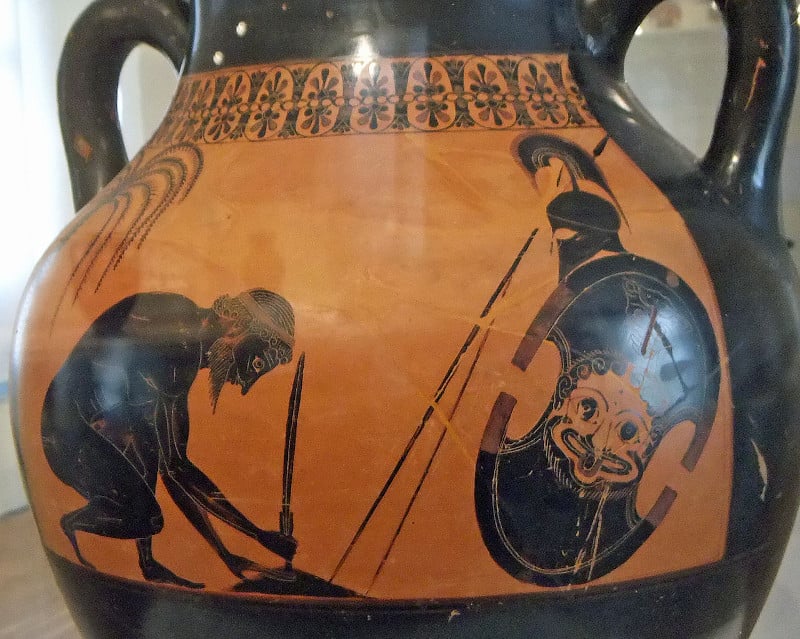
The Art of Madness: Mental Illness in Greek Tragedy
The fragility of the human mind has always been subject to fascination. Ancient societies attempted to understand and remedy emotional pain and suffering by looking to the gods, oracles, or through spells and rituals. The Greeks took this perplexity and made it a topic of intense study. Although they continued to incorporate the supernatural, they allowed themselves to theorize, capturing mental health in a way that was influential and revolutionary for its time.
Thus, great poets and tragedians, like Homer, Sophocles, and Euripides were able to create timeless works of art that made even the most deranged experiences relatable and entertaining. Now more than ever, modern scholars are equipped with the tools and opportunity to explore the intricate psyches of these unique characters and their traumas, providing an insightful glance at mental illness in the Greek imagination.
- Aristophanes and Euripides: The Comedy and Tragedy of Fifth Century BC Greek Women
- Masks, Sex, Laughter, and Tears: The Exciting Evolution of Ancient Greek Theater
Plights of War: Ajax and Heracles
Ajax was destined for greatness, or so it seemed. During his younger years, he met the infamous Achilles. Together they playfully dueled, practicing the ways of battle, eventually forming a brotherly bond. When war was set to occur along the beaches of Troy, both Ajax and Achilles were to join Agamemnon’s great army against the Trojans. He fought victoriously; his strength and endurance equal to his peer, Achilles. With Athena on their side, all had expected the magnificent hero duo to lead them to victory, though fate had other plans.
Achilles was killed when Paris, son of the Trojan king and cause of the war, shot his only vulnerable spot, his ankle. Overcome by rage and despair, Ajax set out with Agamemnon to collect his remains. Entering the battlefield, Ajax went completely berserk, mutilating anyone in his way. After Achilles was returned to camp, a decision had to be made. Initially, Ajax was promised Achilles’ legendary armor; however, with a quick-witted tongue, Agamemnon snatched it away from him. Not only did he lose his dearest friend, but he now had also been betrayed by those he trusted.

Attic black-figure amphora depicting the suicide of Telamonian Ajax. (Ptyx / CC BY-SA 3.0)
Sophocles describes Ajax’s anguish, as his thoughts soon filled with images of viciously killing his commanders, Agamemnon and Menelaus. Under the spell of delusion, believing that he was to kill them, Athena led Ajax to innocent herdsmen and their livestock, which he then slaughtered. When his senses finally returned, his heart flooded with shame and guilt. He had finally given up, fleeing down to the shores of the beach and hiding in a grove. It is there that he succumbed to his emotions, contemplating his death, inevitably laying atop his sword and ending his pain forever.
The story of Ajax invokes both anger and empathy in its audience. The basis of his suffering was a Post-Traumatic Stress response. After losing Achilles, violence erupted out of him. Some of the most damaging symptoms for those amid war with the constant stressors of death and uncertainty are rapid mood swings, violent tendencies, memory loss, and disturbing intrusive thoughts. According to modern psychologists, the effects of PTSD on the mind can lead to more serious issues if the proper help is not received. Unfortunately, for Ajax, this combination of horrific events led him to become severely depressed, experiencing psychosis, hallucinations, and suicidal ideations.
Despite being written and told by those who had no formal concept of PTSD, the complexities of Ajax’s condition are so incredibly accurate that it is used as a form of therapy for modern-day veterans. Whether they are acting out the scenes or watching in the audience, those who are experiencing the negative effects of PTSD find his story to be deeply relatable. Adding legitimacy to this treatment, scholars claim that it is meaningful and highly effective in relieving some of the anxieties associated with the disorder and the fear of stigma surrounding mental illness among military personnel.
Another prominent figure plagued by the negative effects of PTSD was none other than Heracles. Most remember him for his epic labors that once completed, gave him fame and immortality. Yet, the cause for those labors was deeply disturbing. As Euripides had written, Heracles returned from war, eager to reunite with his beloved wife and children. Hera, on the other hand, was full of hatred towards Heracles. Her husband, Zeus, had an unfaithful union with a mortal woman, and through this, Heracles was born. Zeus was extremely fond of the great warrior, and Hera had grown resentful. Accordingly, she planned his downfall by sending Lyssa, the manifestation of a warrior’s rage, to his home on that fateful day.




